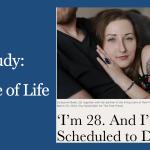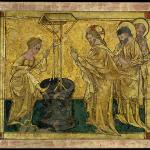The world we live in is a fallen world. Until the eschaton, it will never find perfection. This fact should not mean that we can be lazy and give up working for the betterment of the world. No, we should always strive for perfection, even if we know it is unattainable. In a sense, however, it is attainable and indeed, Christians in their experience of Christ at communion do encounter it and find it for one great moment at the Lord ‘s Table.
Christians should always have their eye on the end, on perfection, while realizing the state of the world they live in. They must understand what the world is like, and how powerful evil can be and is in it. But they must engage the world. They can’t turn their backs on it. Such a gnostic response is always the response of a coward. Yet they must be realistic; what they can do for the world is good, even if it is limited. If they engage politics, it means they must understand that no political position will be perfect in and of itself. They can expect no politician or political idea to fix all earthly problems. More importantly it means that when engaging politics, they will be engaging a fallen structure, and they will have to make deals with people who do evil. There is no way out of it. There is no way beyond the fact that politics requires compromises, and the end result of any political action will never meet any ideal. People involved with a given political action will be cooperating with one kind of evil or another.
In cooperating with one who does evil, one is themselves not necessarily doing evil. Some forms of cooperation, of course, would be. But others must not be seen as such. Cooperation does not necessarily mean agreement. One must look at how the cooperation is engaged and see if the kind of cooperation is acceptable or not in itself. We really must be realistic and truly understand this fact. “Working with” someone does not mean “agreement with” all aspects of that person’s policies or decisions. St Thomas More clearly worked with Henry VIII, and was willing to help him out, even after Henry VIII’s defection from the Catholic faith. Henry, by this time, was engaging quite a bit of evil, but St Thomas More thought that not only was there a level of cooperation he could have with the king, it was required of him to give as much cooperation as he could if his conscience didn’t cry out against it. St Thomas More understood a fact which people have forgotten today: there are many ways to work for a given end. St Thomas More wanted to help his old friend back into the Church and to protect England from disaster. While his way might not have worked out, no one could have predicted failure. If he were alive today, pundits might besmear his reputation for his working with Henry; Catholics in his day understood the situation and understood there were no easy answers.
Christians are required to look for and try to bring about the good, but they are expected to use their wits and conscience to find prudential means by which the good can come about. Sometimes that means temporal cooperation with evil, but when that is the case, that kind of cooperation must have a limit (as St Thomas More also shows us). What is that limit? When a given means breaks the moral law, one can not practice it, even if the positive law of the land demands it. Many times, however, working with someone who is evil, and even enacting evil (as Henry VIII did) does not mean one is themselves working for or enforcing such evil means.
When people disagree about the best means to an end, some think that those who disagree with them must be working for evil. They don’t understand the complexity of the situation and how people will think things through differently. To argue against other possible means as being the result of some amoral motives is to judge the situation with an insight few can really possess, and if you don’t, then it is a judgment call which is itself sinful.
Yes, people can be naïve and follow or trust someone they shouldn’t. But that happens to all of us in life. To judge whether or not such an action is naïve (let alone evil) requires hindsight, the kind which can look to history and judge it, and the kind which we do not have when we are working for some future which hasn’t yet manifested itself. Of course, in political debates, it’s a common enough expression by people from all sides of an issue. It’s a kind of self-affirmation we need, because we are often in doubt of our own answer. If we can’t understand the ways of others, and so we judge what they say to be foolish just because we can’t understand it, this makes us feel as if our answer is indeed the best possible one even if it is not. Historically, indeed, such assumptions about others have often led to devastating results because the one who thought it was the one who was foolish. Perhaps one of the greatest historical examples of this fact can be found in the life and work of St Alexander Nevsky.
St Alexander Nevsky, the Grand Prince of Novgorod and Vladimir, inherited the throne in the middle of the Tatar Yoke. While it is clear that Mongol rule over Rus was terrible, and his people wanted independence from them, Alexander Nevksy understood the reality of the situation: they were not capable of attaining freedom and any attempts at it would cause severe reprimands from the Golden Horde. He knew that, for his lifetime, the best thing to do was to cooperate with the Mongols, no matter how difficult it made things, and no matter what kinds of evils were done at their hands. Not everyone agreed with him. Indeed, many thought ill of him because of it. More than once in his life he had to overcome rebellion, even against members of his own family. When political intrigue indicated that a certain region under his control was planning to revolt, he would do what he could to squash it, but if he couldn’t, he would tell the Mongols what was happening, and even help them to end the rebellion. Such tactics, of course, satisfied the Mongols: since he was seen to be loyal to them, he was able to gain many benefits from them for his people. For example, he was able to exempt his people from joining the Tatar army, a remarkable feat which could not have been done save for his acts of fidelity. More importantly, it left his people with a sort of independence, since he was trusted to rule over them, and it gave them more than enough time to eventually gain the strength needed to overcome Mongol rule (something which would happen after his lifetime). Clearly, Alexander Nevsky cooperated with evil when he worked with the Mongols, especially when he even helped enforce their rule upon his people. However, he also knew that it was such a means which was needed to buy his people enough time to grow and become strong in their own right. Without it, they would have easily perished. But with it, he was able to preserve his cultural and religious heritage intact (one of the reasons why he was canonized by the Orthodox). Those around him often considered him a traitor: he was naïve, because everyone knew that Mongol rule was wrong. Yet, they were shown to be the one in the wrong when their rebellions were overcome and Alexander Nevsky’s political aims were achieved after his death.
Perhaps it is time we realize that the difficult situation we face in politics requires people to have strange bedfellows. Arguing against someone because of those they associate with is always fallacious (though, of course, if it is more than mere association, but pure agreement with an evil means, it’s no longer guilt by association, but guilt by action). We might not understand why they think a given action will result in an ends, especially when the means seems contrary to the ends (such as St Alexander Nevsky’s cooperation with the Mongols). But it is wrong to impute upon them evil intentions, or naiveté, just because we disagree with them. If we do, we will begin to criticize actions of the saints. And it won’t be just any kinds of actions, but the actions which they followed that led to their canonization. Is this really what we want to happen as a result of our political theories?















